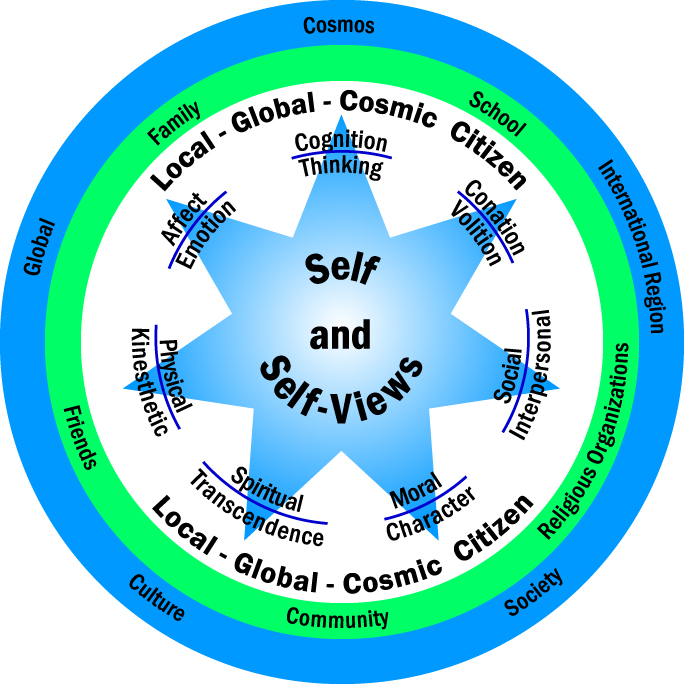
Becoming a Brilliant Star
Developed by: W. Huitt
Last Modified: July 2011
Return to: | Bahá'í Home Page | Home Page |
There is much discussion in education and psychology about the need to "develop the whole child." But what exactly does that mean? In order to answer that question one needs to have some view of the nature of a human being and the purpose of this life. The concept of "Becoming a Brilliant Star" is designed to address this issue. This page and associated links provide access to materials used in an Institute course and deepening programs that address issues of human development and education from the perspective of Bahá'í scripture. The primary audiences include parents, educators and others responsible for developing the qualities of children and youth. Two additional data bases are available that provide information based on scripture from other world religions as well as from the perspective of science. The intent is to demonstrate the unity of science and religion as it relates to human growth and development.
The Brilliant Star graphic shown below has as its focus three critical issues that face young people today: vision, character and competence. Vision relates to dreams and goals of what is possible and desirable to do. Character has to do with the habits or patterns of thinking, feeling, willing and behaving that link to issues of right and wrong, justice and equity, and morality. Competence has to do with the knowledge, values, attitudes and skills that relate to successful performance. All three issues are intertwined and difficult to separate, although our experience suggests these can be observed separately in people.

The Brilliant Star is comprised of eight domains of competence, plus citizenship. Central to the concept of Becoming a Brilliant Star is the issue of self
and three faculties of mind traditionally identified in psychology:
The framework also acknowledges the physical and spiritual domains of human existence:
and the domains of social and moral character:
Finally, the Brilliant Star framework considers the issue of citizenship and its social roles:
One of the major purposes of the Brilliant Star framework is to provide description of the components required to develop a vision about possibilities and desires that will lead one to set goals and strive for excellence in each area.
It is hoped that these materials, used in combination with other available materials referenced above, will assist educators to develop courses and programs of study that integrate the knowledge bases developed through science and religion. An introductory unit provides a starting point for the entire Institute. An overview that includes selections from all of the dimensions is also available. Enough material is provided for a 1 1/2 to 3 hour presentation for each session. [Note: These materials are saved in PDF format which requires Adobe Acrobat reader; go to the Adobe Acrobat Website to download the reader if you don't already have it installed with your browser.]
Three fundamental principles guide the development of the Brilliant Star concept. First, the foundation of an educational program should seek guidance from both science and religion, the twin standards for judging truth. The equality of science and religion is a fundamental belief of the Bahá'í Faith. The sacred writings are used to develop the knowledge base for a vision of what excellence would look like in each dimension.
Second, the concept is being developed from a "systems" or "organismic" perspective. From this viewpoint, the individual is seen as a living system influencing and being influenced by the social and cultural context in which one lives. This is compatible with the philosophy of ‘Abdu'l-Bahá (Savi, 1989) and the most modern scientific views (e.g., Capra, 1997).
Third, a person's character is seen as foundational to the development of competence in each of the nine dimensions. Character, in this sense, refers to the underlying qualities of a person's moral or ethical knowledge, attitudes, values, and commitments that are systematically displayed in one's behavior. Character relates to the quality of one's life, especially the moral and ethical decisions and actions one makes. The major distinction of character is that it is seen in one's behavior. One cannot rely exclusively on surveys or interviews, especially those developed from discussions of hypothetical situations, to make statements about character. Data must come from actual behavior or, at a minimum, reports of actual behavior.
A variety of Institute and deepening programs have already been developed by others that address the important concerns of vision, character, and competence. The intent is to utilize existing materials as much as possible. I have attempted to identify both web-based and traditional resources that might be used in each domain of the Brilliant star. For example, in the dimension of "Spiritual Development" I highly recommend two publications developed by the Ruhi Foundation: "Spiritual growth" and "Reflections on the life of the spirit." However, I have provided some material in each domain for those who might have difficulty accessing published documents.
The following materials have been developed to help put into practice the insights developed in the Brilliant Star compilation:
References and Additional Resources
Books, etc.
Return to: | Bahá'í Home Page | EdPsyc Interactive Home Page |